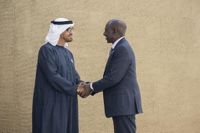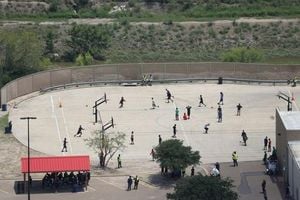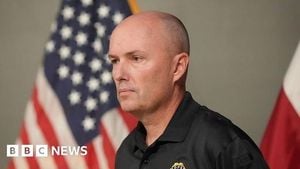The United Arab Emirates (UAE) is establishing itself as a crucial investment partner in Africa, having committed approximately $60 billion over the past decade. The UAE's ambitions were notably outlined during the 28th Conference of the Parties (COP28) in Dubai in December 2023, where plans were made for Emirati companies to develop green initiatives across several African nations, including Angola, Uganda, the Republic of Congo, Kenya, and Mozambique. These initiatives focus on solar, hydro, and geothermal energy projects.
According to data from FT Locations, between 2019 and 2023, Emirati companies announced an impressive $110 billion worth of projects in Africa, with $72 billion exclusively dedicated to renewable energy. Investments made by DP World, a major logistics firm based in the UAE, are evident in the enhancement of African port facilities, reflecting a broader Emirati strategy to tap into various sectors on the continent, including health, fintech, and mining.
Despite these aspiring partnerships, the UAE's growing influence in Africa has not come without controversy. On March 4, 2025, Sudan filed an application to the International Court of Justice (ICJ), accusing the UAE of complicity in genocide orchestrated by the Rapid Support Forces (RSF) against the Masalit ethnic group in West Darfur. This claim arises from the RSF’s siege of El Geneina, the capital of West Darfur, where it reportedly engaged in acts such as extrajudicial killing, ethnic cleansing, and systematic violence against civilians.
In their ICJ application, Sudan alleges that the UAE has played a direct role in fueling the conflict, reportedly sending agents to lead the RSF militia and manage political communications. Sudan accuses the UAE government of not only providing substantial financial support to the RSF but also of sending arms and military equipment, including advanced drones. These claims are supported by UN experts who have indicated that the UAE is the primary provider of the RSF.
Carlos Lopes, an honourary professor at the University of Cape Town, reflects on this duality, stating, "The UAE’s increasing role as Africa’s largest investor signals a shift in global economic dynamics." He emphasizes that while the UAE's investment can lead to economic growth and job creation in Africa, the ongoing allegations of involvement in genocide highlight a complex geopolitical landscape. Vera Songwe, founder of the Liquidity and Sustainability Facility, notes that the UAE’s initiatives signify a move towards long-term strategic goals focused on sustainable development rather than merely exploiting natural resources.
While the investment strategies may seem beneficial, criticisms about the UAE’s conduct in Sudan introduce significant concerns. Husam Mahjoub, a Sudanese tech expert, expresses wariness about the UAE’s intentions, warning that foreign-led projects must prioritize local needs and avoid exploiting African nations. He cites how the UAE distinguishes itself from Western powers by executing projects efficiently and without imposing the bureaucratic conditions often seen with institutions like the World Bank and IMF.
However, Mahjoub cautions against the pitfalls of reliance on foreign investments, stating that "satellite imagery captured between December 2024 and February 2025 showed drones and newly constructed hangars at an RSF-controlled airport in Nyala, South Darfur," underscoring the dangerous intersections of aid and conflict in the region.
Further complicating the UAE's relationship with Africa is the gold mining sector, particularly with regards to smuggling. Reports indicate that the UAE emerged as the leading destination for smuggled gold from Africa, with approximately 405 tonnes of undeclared gold flowing into its markets in 2022. This hidden resource stream has raised red flags about illicit financial operations, particularly concerning conflicts in Sudan and other regions.
As Sudan pursues legal redress at the ICJ, it faces challenges due to the UAE’s reservation to the Genocide Convention, which traditionally limits the jurisdiction of the court over such matters. According to international law experts, Sudan's arguments may struggle to gain traction because the UAE's legislative framework permits certain protective measures against ICJ intervention.
Yet, the act of bringing this case against the UAE reflects a broader strategy by Sudan to draw global attention to its plight and the alleged actions of UAE-backed forces in its territory. Amid the evolving dynamics of international relations, Sudan's legal maneuvering highlights a critical moment where nations are increasingly willing to confront powerful states in international legal forums.
The dual narrative emerging from the UAE’s investments in Africa unveils a complex interplay of aspiration, opportunity, and ethical concerns. As Africa grapples with significant infrastructure challenges and seeks partnerships that truly serve its developmental goals, the role of the UAE remains both promising and fraught with peril. Analysts suggest that the UAE’s technological capabilities and investments could indeed catalyze critical growth across the continent. However, the need for transparency and equitable benefits to local populations from such ventures cannot be understated.
Reflecting on the prospective future of UAE-Africa relations, Lopes and others advocate for a cautious yet optimistic approach that favors mutual benefits without repeating history’s exploitative patterns. The UAE, by focusing on infrastructure, renewable energy, and other pivotal sectors, has the potential to be a transformative partner for Africa, provided that it prioritizes ethical engagement and contributions to local economies.





